Application of membrane curtain wall
Date:2015.4.3 Hit:19828
Membrane curtain wall is the application of membrane structure in building envelope. It has the common characteristics and advantages of membrane structure: membrane structure is a new non-traditional structure. Tension-filled and changeable curved surface, free and sensitive large space, bright and mild indoor environment composed of transparent and translucent membrane materials, masts, cables, delicate metal joints and other structural technologies with modern flavor, these characteristics make the membrane structure provide people with a completely new visual experience different from the traditional structure, and provide unprecedented broad space and many new possibilities for architectural design (including architectural environment design).
Modern membrane structure technology has experienced more than 30 years of development in Germany, the United States, Japan and other countries, and now it has become mature. Architects have fully developed and applied the possibilities provided by this new structural technology, and have constructed many typical large-scale membrane structures, which highly represent the harmony and unity of architecture and structure, the perfect separation of technology and art. There are many membrane structures which have become the local representative human landscape.
The design of membrane structure is also different from that of traditional structure. Flexible membranes have a definite shape and stiffness to resist external loads only when they are given proper pre-tension. Therefore, the initial shape analysis is of fundamental significance in the design of membrane structures. Cutting analysis is another special problem in membrane structure design: the surface shape of membrane structure is generally undevelopable. Cutting analysis is to request reasonable layouts on planar membrane materials in order to fit the corresponding strips on space surface as accurately as possible. Moreover, the initial morphological analysis and cutting analysis of membrane structure is not only a simple mechanical or technical problem; its initial morphological analysis is inseparable from the architectural appearance, and the pattern of membrane joint is often an important interior decoration wrist and a powerful tool to express the interior space. So from the beginning, the design of membrane structure asks architects and structural engineers to cooperate closely and cooperate with each other. In fact, this new system of architectural design and structural design is a unified whole, should be separated together at the same time stop and complete.
The calculation and analysis of membrane structure also has its particularities, such as: the displacement of this flexible structure system is very large, and its geometric nonlinearity must be considered in calculation; wind is the external load which plays a decisive role in the design of membrane structure, and membrane structure is very sensitive to the dynamic action of wind, so it is necessary to think about in design and calculation, and sometimes it is necessary to further consider the coupling and cooperation between air flow and structure. The so-called aeroelastic dynamic response problem. These characteristics increase the design difficulty of membrane structure to a certain extent.
The development of curtain walls with membrane structure and membrane structure depends on the technological innovation and development of membrane materials. Historically, the accumulation of material technology has brought more and more innovations to architecture and endless high requests. From modernism to post-modernism, to deconstructionist architectural theory, to the so-called chaos theory, there are no exception to request material reactions, and each material reactions add more new creative vocabulary to architecture.
From the point of view of architectural colorology, through the color or nature of the facade of the building to see the color of the interior, from light to dark or from dark to light, the architect can achieve the desired architectural optical color effect according to the level of depth planning, the color of the cold and warm layout, the similarities and differences of the direction of the light source day and night.
People's understanding and grasp of architectural beauty has promoted the invention and development of architecture from different perspectives. A good environment can arouse people's aesthetic feeling. A good environment can also give people different psychological feelings such as identity, kindness, identification, culture and adaptability. The progress of material technology can stimulate the heterodox body in the art of architectural creation. Often, this kind of heterodox unreasonable design can be rationalized by using new materials. This heretical idea can be accomplished by adopting new construction methods.
From the perspective of architecture, the laxity, disorder, dislocation, adventure and occasional of Deconstructionism can be well nourished in the progress of material science, immersed in the architectural culture, showing a great miracle of blooming flowers and magical workmanship. Membrane structure, membrane structure curtain wall and membrane structure roof are exactly the same.
Membrane Material for Curtain Wall Membrane Structure
The development of membrane structure and membrane structure curtain wall depends on the technological revolution and development of membrane village. Historically, the revolution of material technology has brought more and more innovations to architecture and endless high requirements. From modernism to post-modernism, to deconstructionist architectural theory, even the so-called chaotic theory, all require material revolution without exception, and each material revolution adds more new creative vocabulary to architecture.
There are two kinds of membrane materials for curtain wall: fabric membrane and foil membrane. Fabric membranes: according to the different weaving can be divided into plain weaving, knitting; according to the fiber material can be divided into polyester fabric, glass fabric; according to the coating can be divided into unilateral coating, bilateral coating. At present, fabric coating film is the mainstream material.
Common fabric membranes include:
(1) PVC Membrane: PVC Coating and Polyester Fiber Base Composite
(2) PTFE membranes: PTFE coating and glass fiber base composite.
(3) PVC film with surface layer: polyvinylidene fluoride or polyvinyl fluoride is coated on the surface of PVC film.
ETFE foil film: High strength foil film is made of fluoroplastics. It can also exert pre-tension like fabric film. It has high transmittance, self-cleaning and anti-aging properties. ETFE foil film has been widely used in curtain walls and roofs in recent years.
ETFE materials are excellent environmental protection materials:
The chemical name of ETFE is ethylene-tetrafluoroethylene copolymer. It is extracted from sea water. It consists of 25% ethylene and 75% tetrafluoroethylene. It belongs to the family of PTFE fluoropolymer products. ETFE is a fluorine-containing polymer, thermoplastic material, with excellent chemical resistance and high mechanical strength; good weather resistance, heat resistance, fire resistance; almost all chemicals.
No reaction occurs; direct exposure to sunlight, rain or exhaust gas does not cause loss or deformation, and long exposure to the outdoors does not change the characteristics. ETFE film is made by extruding ETFE particles. The common thickness of membrane material (from 50 m to 300 m) is very light.These properties determine the good service life and application range of ETFE membrane structure.
Comparison of PVDF/PTFE/ETFE Films
|
Designed service life |
Unit |
PVDF |
PTFE |
ETFE |
|
Designed service life |
Years |
15~20 |
>25 |
>25 |
|
Fire resistance rating |
- |
B1(Hard to burn) |
A(Non combustible) |
B1(Hard to burn) |
|
Thickness of commonly used membranes |
mm |
0.50~1.25 |
0.35~1.10 |
0.10~0.30 |
|
Tensile strength (radial/latitudinal) |
kN/m |
114 / 108 [1] |
183 / 167 [2] |
45 [3] |
|
Fracture elongation (radial/latitudinal) |
% |
24 / 30 [1] |
3~10 / 6~15 [2] |
400 [3] |
|
Calculating modulus of elasticity (radial/latitudinal) |
kN/m |
475 / 360 [1] |
3000 / 1200 [2] |
225 [3] |
|
Safety factor |
- |
5.0 |
5.0 |
~3.5 |
|
Transmittance |
% |
4.7 |
12 ± 3 |
20~94 [3] |
|
Commonly used brands |
- |
Mehler
Ferrari |
Chukoh Saint Gobain Verseidag |
Asahi Nowofol |
ETFE film provides a brand new material for curtain wall and roof of modern architecture. The roof and wall made of this kind of membrane material are light in weight, only 1% of the glass quality of the same size; it has good toughness, high tensile strength, not easy to tear, and its ductility is more than 400%; it has strong weatherability and chemical corrosion resistance, melting temperature is up to 200 C, and it will not spontaneously ignite. It can be processed into any size and shape to meet the requirements of large span and save the intermediate support structure. Simple and elegant structure can be designed.
Moreover, the film has good acoustic properties, can effectively eliminate echoes and avoid noise from the top of the glass layer, and has self-cleaning function, so that dust is not easy to adhere to its surface. Another advantage of this kind of material is that it can be used to prefabricate film bubbles on site, which is convenient for construction and maintenance. In recent years, the membrane material made of ETFE has shown incomparable advantages in replacing the traditional glass and other polymer lighting boards for the roof or wall of large buildings.
Classification of Membrane Curtain Wall System
The membrane structure of curtain wall can be divided into three categories according to the form of structural system:
- Skeleton membrane curtain wall,
- Tensioned cable-membrane curtain wall,
-
Inflatable membrane curtain wall.
Skeleton membrane curtain wall
The skeleton membrane structure is a rigid skeleton composed of steel or other materials. The skeleton has natural stability and integrity. The membrane is stretched and placed on the skeleton to form the skeleton membrane structure with plane shape, single surface shape and hyperbola represented by saddle shape. The remarkable characteristic of skeleton membrane structure is that the membrane is not the necessary structural unit to maintain the existence of the structural system, but it is not only a simple roof covering system, but also gives full play to the functions of daylighting buildings and high-strength stress characteristics.
Although the effect of Pre-tension on the shape of skeleton membrane structure is less than that of tensioned membrane structure, it is necessary to introduce sufficient tension to ensure the mechanical characteristics of the structure, so as to avoid large vibration of the membrane surface under wind load, leading to sagging of the membrane surface. The skeleton is generally exposed to the inside of the membrane, and the transparency of the membrane highlights the indoor visual effect of the skeleton. Therefore, the layout, form, material and joint of the skeleton are the key points in the design consideration, and we should strive to be concise and beautiful.
Skeleton membrane curtain wall is a single-layer membrane structure, which relies on the internal stress produced by the membrane material through the tension surface to resist external loads. The membrane material can be ETFE film, or PVC or PTFE film.
ETFE stretching film is generally not in the form of setting steel cables around it and tensioning the film through the steel cables, but cutting the single layer ETFE film into the desired shape, and setting the edge rope around it, holding it with a special aluminum alloy clamp, by exerting tension on the peripheral clamp, the membrane is fully tensioned, and the external load is resisted by the prestressing force inside the membrane material. Because of the low tensile strength of ETFE, too much pretension force can not be applied.力,
The ability to resist external loads is also poor, so the membrane elements with large specifications are generally not used. In special cases, when the larger specifications are required, the membrane structural elements are generally strengthened in the middle, and are divided into several smaller units by steel beams or cables. Under the same load conditions, without other strengthening measures, ETFE membranes can be made into large area air pillows by inflatable form, some even up to 100 square meters, while in tension form, because the tensile strength of membranes is lower than that of PTFE membranes, the applied prestressing force can not be too large, the ability to bear external loads is limited, and the single area of ETFE membranes will be limited to a certain extent.
There are many engineering applications of ETFE tensioned membrane abroad, but the scale is not large. In our country, the application is the National Stadium-Bird's Nest. At that time, some membrane units had an area of more than 100 square meters, and architects did not want to divide several small lattices in the middle of the main steel structure to affect the outward visual effect. Therefore, it is necessary to strengthen the membrane structure. After research and repeated tests, steel beams and cables are creatively installed on the back of the membrane, and stainless steel cables and ETFE membranes are combined by special technology to bear both positive and negative external wind and snow loads. The stainless steel cables are fixed on the steel beams crossing vertically with them. The steel beams and cables are hidden behind the membrane and the appearance is invisible, then it achieved the expected outward-looking effect. Generally speaking, if ETFE membrane is tensioned, its application scope is limited, except for open buildings without thermal insulation requirements.
Tensioned membrane curtain wall
Membrane structure used in building is mainly tensioned cable-membrane structure system. As the name implies, tensioned cable-membrane structure produces certain prestressing force inside the membrane through tension to resist external wind load and other loads, and at the same time makes the membrane deformation into the desired shape. Tension membrane is a stable bearing system which depends on the tension force of membrane itself and the special geometric shape. Membranes can only withstand tension but not compression and bending. Their surface stability is guaranteed by the opposite curvature. Therefore, they need to be made into concave and convex space surfaces, so they are also known as space membrane structures. The tensioned membrane structure is usually a tensioned cable-membrane structure, which lays steel cables along the edge of the membrane and exerts tension on the cable. The steel cables drive the membrane to stretch and form, and produce enough prestress. If the membrane area is too large, the membrane itself can not bear the expected load, it can be added in the middle of the membrane to strengthen the cable to improve its wind load resistance. The tensioned cable-membrane structure can be made into arbitrary complex curved surface shape according to the need, which reflects the beauty of natural fluency, and has a variety of color membrane materials to adapt to the surrounding environment and meet the requirements of architectural effect. Moreover, the membrane structure is light in weight and generally does not need too large support structure, which is an advantage that other building materials can not match.
Inflatable membrane curtain wall
The inflatable membrane structure is produced on the basis of ETFE membrane material technology. It combines two or more layers of membrane through hot melt welding to form a closed bag-air pillow, whose periphery is clamped in the frame made of aluminium alloy or other materials, and the frame is fixed on the main structure of the building. In the air pillow, the air-filled membrane structure system is made by filling the clean and dry air filtered and dehumidified through the reserved valve ports. This kind of air-filled structure is widely used in the building envelope.
ETFE pneumatic membrane structure is based on the strength of membrane itself and the internal pressure of the air pillow to bear external loads. Although the tensile strength of ETFE membrane is limited, the internal pressure of the air pillow can be adjusted and balanced properly according to the need. At the same time, the relaxation caused by the installation temperature can be solved by the adjustment and balance of the internal pressure. Air pillow has strong bearing capacity, and has prominent advantages in heat preservation, sound insulation, fire prevention, self-cleaning, light performance, green environmental protection and so on. Therefore, it has been widely used in modern buildings, especially as the enclosure structure of large-span space buildings.
In order to improve the thermal insulation effect of ETFE inflatable film, the number of layers can be increased from 2 layers to 3 layers and 4 layers. Considering the use function of the building, the transmittance of the film can be reasonably controlled. The inflatable control system can be intellectualized by adopting the measures of color or printing plating points and patterns.
With the further development of modern science and technology, human beings are facing the historical mission of protecting the natural environment. Therefore, natural materials and traditional ancient building materials will be replaced by light and thin high-strength lightweight materials with good thermal insulation performance. Cable-membrane construction technology will play an important role in this change. Its wider application in the field of architecture is predictable and has a bright future. Architectural form art is free to shape. Variable supporting structures and flexible membranes make the building more diversified, novel and beautiful. Meanwhile, they embody the beauty of the structure and have rich colors, which can create a freer architectural form and a richer architectural language. Because of its light weight, cable-membrane buildings can achieve large-span covering space without internal support, overcome the difficulties encountered by traditional structures in long-span (unsupported) buildings, which makes people more flexible and creative in the design and use of larger-span building space. Membrane structure is a new form of architectural technology with the development of modern science and technology. It is a comprehensive product of the rapid development of material science, architecture, structural mechanics and modern environmental science.
-
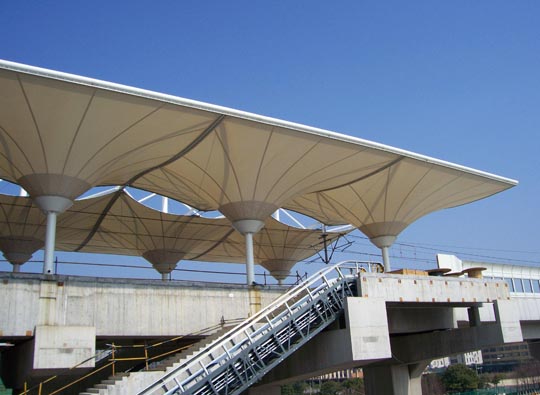 Application of Membrane Structure in Rail Transit...
Application of Membrane Structure in Rail Transit... -
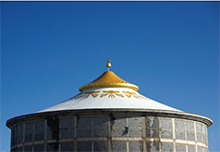 Application of Thermal Insulation Lining Technology in Membrane Archit...
Application of Thermal Insulation Lining Technology in Membrane Archit... -
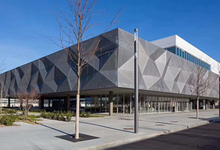 Application of membrane curtain wall...
Application of membrane curtain wall... -
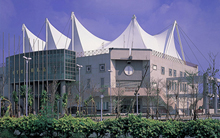 Application of Membrane Roofing...
Application of Membrane Roofing... -
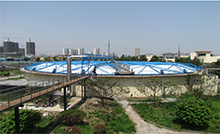 Application of Membrane Structure in Environmental Protection Engineer...
Application of Membrane Structure in Environmental Protection Engineer... -
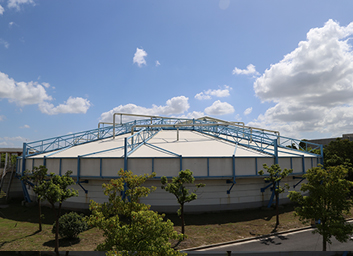 Application of Membrane Structure in Sewage Treatment Plant...
Application of Membrane Structure in Sewage Treatment Plant...

